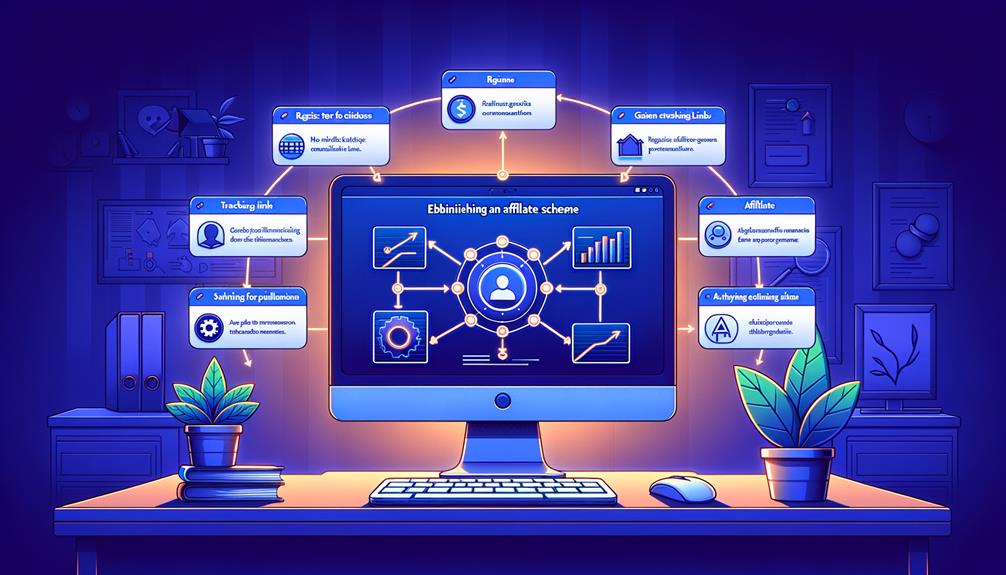Did you know that 81% of brands and 84% of publishers utilize affiliate marketing to boost their revenue? It's clear that affiliate programs have become a fundamental component in the world of ecommerce.
If you're looking to drive sales, increase brand awareness, and tap into a wider audience, then you've come to the right place. In this article, we'll take you on a journey through the intricacies of affiliate programs, providing you with a step-by-step guide that will equip you with the knowledge and tools to successfully implement and manage an affiliate program for your ecommerce site.
From understanding the different types of affiliates to addressing the challenges that come with running an affiliate program, we'll cover it all. So, if you're ready to take your ecommerce site to new heights, let's dive in and discover the world of affiliate programs together.
Understanding Affiliate Programs
Are you curious about how affiliate programs work and what benefits they offer for ecommerce sites? Well, let's shed some light on the topic.
Affiliate programs are a win-win situation for both ecommerce sites and their affiliates. It's a relationship between the advertiser, which is the ecommerce site, and the publisher, which is the affiliate. The affiliate promotes the products or services of the ecommerce site through various channels like search engines, blogs, influencers, coupon sites, and even email marketing.
So, what're the benefits of affiliate programs for ecommerce sites?
First and foremost, it leads to increased brand awareness and visibility. When affiliates promote your products, more people get to know about your brand.
Secondly, affiliate programs provide easily trackable data. You can measure the performance of your affiliates and determine the effectiveness of your marketing efforts.
Lastly, affiliate programs are a cost-effective marketing strategy. You only pay affiliates when they successfully bring in customers or generate sales, making it a cost-efficient way to reach your target audience.
Understanding how affiliate programs work and the benefits they offer can be liberating for ecommerce sites. It opens up new avenues for growth and allows you to tap into the vast network of affiliates who can help promote your products.
Types of Affiliates
There are several types of affiliates that ecommerce sites can partner with to promote their products and increase their online presence.
One type of affiliate is search affiliates, who specialize in using search engine optimization (SEO) techniques to drive traffic to a website. They can help improve a site's visibility in search engine results and attract potential customers.
Another type of affiliate is bloggers and influencers, who have a large following and can create content that promotes a brand or product. They often have a loyal audience that trusts their recommendations, making them valuable partners for ecommerce sites.
Coupon sites are also popular affiliates, as they offer discounts and deals to attract customers.
Finally, email marketing affiliates can promote products through targeted email campaigns, reaching a specific audience directly.
Benefits of Affiliate Programs
As we delve into the benefits of affiliate programs, ecommerce sites can reap numerous advantages by partnering with different types of affiliates to promote their products and increase their online presence.
One major benefit is increased brand awareness and visibility. By leveraging the audience and reach of affiliates such as bloggers, influencers, and coupon sites, ecommerce sites can expose their brand to a wider audience, leading to more potential customers.
Additionally, affiliate programs offer easily trackable data, allowing ecommerce sites to monitor the effectiveness of their marketing efforts and make data-driven decisions. This makes it easier to optimize campaigns and allocate resources effectively.
Lastly, affiliate programs are a cost-effective marketing strategy. Instead of spending large sums on traditional advertising, ecommerce sites only pay affiliates a commission when they successfully drive sales. This ensures a higher return on investment and maximizes the marketing budget.
Considerations in Building an Affiliate Program
When building an affiliate program, it is crucial to carefully consider various factors to ensure its success and effectiveness. Here are some key considerations to keep in mind:
| Consideration | Description |
|---|---|
| Target Audience | Identify your target audience and choose affiliates that align with their interests and needs. This will help ensure that your program reaches the right people and generates relevant traffic and conversions. |
| Commission Structure | Determine the commission structure that works best for your business. Consider factors such as product margins, industry standards, and competitor offerings. Offering competitive commissions will attract high-quality affiliates and motivate them to promote your products. |
| Program Management | Establish clear guidelines and expectations for your affiliates. Regularly communicate with them, provide support, and address any issues or concerns. This will foster a positive relationship and encourage affiliates to actively promote your products. |
| Tracking and Analytics | Implement robust tracking and analytics tools to accurately measure the performance of your affiliates. This data will help you identify top-performing affiliates, optimize your program, and make informed decisions for future growth. |
| Compliance and Fraud Prevention | Put measures in place to monitor affiliate activities and prevent fraud. Regularly review affiliate activities, monitor traffic sources, and enforce compliance with your program's terms and conditions. This will protect your brand and ensure fair and ethical practices within your program. |
Challenges of Affiliate Programs
Building an affiliate program comes with its fair share of challenges that require careful navigation and proactive management.
One of the main challenges is finding the right affiliates who align with your brand and target audience. It can be time-consuming and difficult to identify affiliates who have a genuine interest in promoting your products or services.
Another challenge is ensuring that affiliates adhere to your brand guidelines and promote your offerings in a way that is consistent with your brand image.
Additionally, monitoring and tracking affiliate performance can be complex, especially when dealing with a large number of affiliates. It is important to constantly analyze data and make adjustments to optimize performance.
Lastly, managing relationships with affiliates and resolving any conflicts that may arise can be challenging. Open communication and a proactive approach are key to maintaining strong relationships with affiliates.
Choosing an Affiliate Manager
To ensure the success of your affiliate program, it's crucial to choose an experienced and knowledgeable affiliate manager who can effectively oversee and optimize your affiliate partnerships. An affiliate manager plays a vital role in managing the relationships between your ecommerce site and your affiliates. They're responsible for recruiting new affiliates, providing them with the necessary resources and support, and ensuring that they're promoting your products or services effectively.
When choosing an affiliate manager, look for someone who's a strong understanding of affiliate marketing strategies and techniques. They should have a proven track record of success in managing affiliate programs and driving sales. Additionally, they should be skilled in data analysis and reporting, as this will help them identify trends and optimize your program for maximum results.
It is also important to find an affiliate manager who's proactive and responsive. They should be able to communicate effectively with both you and your affiliates, addressing any concerns or issues promptly.
Finding the Right Affiliate Program Software
Finding the right affiliate program software is crucial for effectively managing and optimizing your affiliate partnerships. With the right software, you can easily track and analyze data, automate processes, and streamline your affiliate program.
When looking for affiliate program software, there are a few key factors to consider. First, make sure the software offers robust tracking and reporting capabilities. You want to be able to see which affiliates are driving the most traffic and conversions, so you can optimize your partnerships accordingly.
Additionally, look for software that offers easy integration with your ecommerce platform and other tools you use. This will make it seamless to manage your affiliate program alongside your other marketing efforts.
Finally, consider the scalability and flexibility of the software. As your affiliate program grows, you want to ensure that the software can support your expanding needs.
Examples of Affiliate Software
Now that we've explored the importance of finding the right affiliate program software, let's take a look at some examples of affiliate software that can help you optimize and manage your affiliate partnerships effectively.
One popular example of affiliate software is Refersion. This platform provides a user-friendly interface and offers features such as tracking, reporting, and commission management. It also integrates seamlessly with popular ecommerce platforms like Shopify and WooCommerce.
Another option is Post Affiliate Pro, which offers advanced tracking and reporting capabilities. It allows you to create customized commission structures and provides real-time analytics to help you monitor the performance of your affiliates.
For those looking for a more comprehensive solution, Impact is a leading affiliate marketing platform. It offers tools for managing partnerships, tracking conversions, and optimizing campaigns. It also provides access to a large network of affiliates, making it easier to expand your affiliate program.
These are just a few examples of the affiliate software available in the market. It's important to evaluate your specific needs and goals before choosing the right software for your ecommerce site.
Additional Resources for Ecommerce Success
When it comes to achieving ecommerce success, having access to additional resources can make a significant difference in your business's growth and profitability. Here are three resources that can help you take your ecommerce site to the next level:
- Ecommerce Podcasts: Listening to podcasts hosted by industry experts can provide you with valuable insights and advice on various aspects of running a successful ecommerce business. From marketing strategies to customer service tips, podcasts can be an excellent source of inspiration and knowledge.
- Online Communities: Joining online communities specific to ecommerce can connect you with like-minded individuals who are facing similar challenges. These communities often provide a platform for sharing experiences, asking questions, and receiving support from fellow entrepreneurs.
- Ecommerce Courses: Taking online courses that focus on ecommerce can give you a deeper understanding of key concepts and strategies. These courses usually cover topics such as product sourcing, marketing techniques, conversion optimization, and more. Investing in your education can pay off in the long run by helping you make informed decisions and stay ahead of your competitors.
Frequently Asked Questions
How Can I Effectively Recruit Affiliates for My Ecommerce Site?
Recruiting affiliates for our ecommerce site can be effectively done through various strategies.
First, we can reach out to relevant bloggers and influencers in our industry, offering them incentives to promote our products.
Additionally, we can leverage social media platforms to connect with potential affiliates and showcase the benefits of partnering with us.
Finally, we can join affiliate networks and actively search for affiliates who align with our brand.
What Are the Best Practices for Managing and Incentivizing Affiliates?
When it comes to managing and incentivizing affiliates, there are a few best practices we swear by.
Firstly, clear communication is key. Regularly touch base with your affiliates, providing them with updates and resources to help them succeed.
Secondly, offering competitive commission rates and bonuses can motivate affiliates to go the extra mile.
Additionally, providing them with exclusive discounts or promotions can give them a unique selling point.
Lastly, don't forget to show appreciation for their hard work and dedication. A little gratitude goes a long way in building a strong relationship with your affiliates.
How Can I Ensure That the Affiliates Are Driving Quality Traffic and Conversions?
To ensure that affiliates are driving quality traffic and conversions, we focus on a few key strategies.
Firstly, we carefully vet potential affiliates to ensure they align with our brand values and target audience.
Additionally, we provide clear guidelines and expectations for the types of traffic and conversions we're looking for.
Regular communication and feedback help us maintain a strong relationship with our affiliates, allowing us to address any issues promptly and optimize performance.
Tracking and analyzing data also play a crucial role in identifying and optimizing for quality traffic and conversions.
What Are Some Common Mistakes to Avoid When Running an Affiliate Program?
When running an affiliate program, it's important to be aware of common mistakes to avoid.
One mistake isn't setting clear expectations and guidelines for affiliates, which can lead to confusion and ineffective marketing efforts.
Another mistake is not regularly monitoring and analyzing affiliate performance, which can result in missed opportunities for improvement.
Additionally, not providing enough support and resources to affiliates can hinder their success.
How Can I Measure the Success and ROI of My Affiliate Program?
To measure the success and ROI of our affiliate program, we utilize various metrics and tools.
Firstly, we track the number of clicks, conversions, and sales generated by our affiliates. This helps us determine the effectiveness of our program in driving traffic and generating revenue.
Additionally, we analyze the cost per acquisition and the average order value to calculate the ROI.
Conclusion
In conclusion, affiliate programs offer a valuable opportunity for ecommerce sites to increase brand visibility and drive sales. By partnering with different types of affiliates, businesses can tap into new audiences and expand their reach. This includes search affiliates, bloggers, influencers, coupon sites, and email marketers.
While there are considerations and challenges to navigate, the benefits of affiliate programs make it a worthwhile investment. These benefits include heightened brand awareness and easily trackable data.
With the right affiliate manager and software, businesses can effectively manage and optimize their affiliate program for success.



